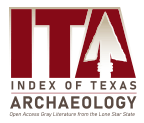Home > Research Projects and Centers > Center for Regional Heritage Research > Index of Texas Archaeology > Vol.
Article Title
Agency
Texas Historical Commission
Abstract
Horizon Environmental Services, Inc. (Horizon) was selected by Berg-Oliver Associates, Inc. (Berg Oliver) on behalf of Harris County Water Control Improvement District (WCID) No. 36 to conduct a cultural resources inventory survey and assessment for the proposed development of a wastewater treatment facility on the approximately 2.6-hectare (6.6-acre) Haden Road tract in Cloverleaf, Harris County, Texas. The currently undeveloped tract is located southeast of the intersection of Interstate Highway (IH) 10 and Haden Road. An unnamed tributary of Greens Bayou bisects the tract east to west. Based on historic-age aerials and topographic maps, no known development has occurred on the 2.7-hectare (6.6-acre) tract.
The proposed project is being sponsored by Harris County WCID No. 36. Funding is being provided through a community development block grant (CDBG) contributed by the Texas General Land Office (GLO). Because the proposed wastewater treatment facility is being sponsored by a public utility and subsidized by a political subdivision of the state of Texas, the project falls under the jurisdiction of the Antiquities Code of Texas (Natural Resources Code, Title 9, Chapter 191). At this time, no federal funding, licenses, or permits are required for the proposed undertaking. However, should any impacts occur to the unnamed tributary of Greens Bayou that flows through the proposed project area, permitting would be required by the US Army Corps of Engineers (USACE) under Section 404 of the Clean Water Act (CWA). In this case, any portions of the overall project area that fall under the federal permit would also fall under the jurisdiction of Section 106 of the National Historic Preservation Act (NHPA) of 1966, as amended. As the project represents a publicly sponsored undertaking with the potential to impact potentially significant cultural resources, the project sponsor was required to perform a cultural resources inventory and assessment of the project area.
On July 26, 2017, Horizon staff archeologist Briana Nicole Smith, under the overall direction of Jeffrey D. Owens, Principal Investigator, performed an intensive cultural resources survey of the project area to locate any cultural resources that potentially would be impacted by the proposed undertaking. Horizon’s archeologist traversed the project area on foot and thoroughly inspected the modern ground surface for aboriginal and historic-age cultural resources. In addition to pedestrian walkover, the Texas State Minimum Archeological Survey Standards (TSMASS) require a minimum of 2 shovel tests per acre for tracts between 3.0 and 10.0 acres in size. As such, a minimum of 13 shovel tests would be required within the 2.7- hectare (6.6-acre) project area. Horizon excavated a total of 15 shovel tests, thereby exceeding the TSMASS for a project area of this size. The survey was conducted under Texas Antiquities Permit No. 8115.
Shovel testing revealed heavily disturbed artificial deposits of mottled sandy clay and dense clay sediments overlying the native clayey fluviomarine soils at depths of 20.0 to 40.0 centimeters (7.8 to 15.7 inches) below surface. Shovel tests were placed along both banks of the unnamed tributary of Greens Bayou. Ground surface visibility was low to moderate due to dense, ankle- to knee-high wild grasses and weeds, which cover the majority of the project area. The southwestern portion of the tract had less vegetation, allowing for better visibility of the heavily disturbed ground surface. Modern trash was abundant throughout the project area, which appears to be actively used as a dump site, and several shovel tests contained modern trash within the upper 20.0 centimeters. (7.8 inches). The majority of modern trash appears to have been dumped within the tree line that follows the southern boundary of the project area. The northernmost portion of the project area is disturbed from the construction of multiple storm water manholes.
Based on the results of the survey-level investigations documented in this report, no potentially significant cultural resources would be affected by the proposed undertaking. In accordance with 36 CFR 800.4, Horizon has made a reasonable and good-faith effort to identify historic properties within the project area. No cultural resources were identified that meet the criteria for designation as SALs according to 13 TAC 26. Horizon recommends a finding of “no historic properties affected,” and no further archeological work is recommended in connection with the proposed undertaking. However, human burials, both prehistoric and historic, are protected under the Texas Health and Safety Code. In the event that any human remains or burial objects are inadvertently discovered at any point during construction, use, or ongoing maintenance in the project area, even in previously surveyed areas, all work should cease immediately in the vicinity of the inadvertent discovery, and the Texas Historical Commission (THC) should be notified immediately.
Creative Commons License

This work is licensed under a Creative Commons Attribution-NonCommercial 4.0 International License
Included in
American Material Culture Commons, Archaeological Anthropology Commons, Environmental Studies Commons, Other American Studies Commons, Other Arts and Humanities Commons, Other History of Art, Architecture, and Archaeology Commons, United States History Commons
Submission Location
Tell us how this article helped you.


